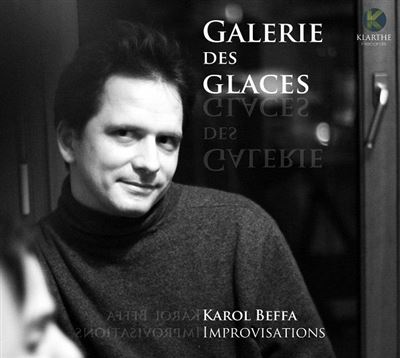23 Improvisationen bilden das Programm dieser CD. Sie wurden innerhalb eines halben Tages im September 2022 aufgenommen. Das Resultat ist völlig authentisch, es erklingt so, wie es gespielt wurde, ohne jeden Schnitt. Die Themen wurden dem Komponisten und Pianisten vor Ort von einigen Bekannten im Studio vorgeschlagen. Innerhalb weniger Sekunden, so sagt Karol Beffa, habe er dann jeweils eine Idee gefasst und den dazu passenden Stil gewählt. Und so wurde das Programm zu einer abwechslungsreichen Reise durch Epochen und Gattungen, ausnahmslos mit nicht niedergeschriebenen Noten.
Waren früher Improvisationen gang und gäbe, blieben sie im 20. Jahrhundert eher verpönt, außer im Jazz natürlich. In den letzten Jahren gibt es auch im Klassikbereich zaghafte Versuche, der Improvisation wieder eine zunehmende Bedeutung zu geben. Karol Beffa hat bereits einige CDs mit Improvisationen herausgegeben, und diese hier zeigt einmal mehr, welch ein Meister im Improvisieren er ist.
Das Programm beginnt mit einer Post-Scriabin-Improvisation, Kafka’s Nightmare. Der Wechsel zu Birdland ist markant, ist dieses Stück doch, wie auch später Calamity Jane, sehr jazzig.
Las Meninas und das sechste Stück, Nights in the Gardens of Spain, das auf Mahler verweisende Adagietto und Le Songe du Cantor sind stimmungsvoll und ruhig, während Le piano préparé, Charlot, Fragments d’explosifs und einige andere Stücke von einer ungewöhnlichen Rhythmik leben.
Sehr evokativ und beklemmend nostalgisch ist Le Belvédère, genau wie Le jour de vielle, eine Reminiszenz an Schubert. Mystisch wird es mit Angelus, während Glockengeläut Carillon nocturne und Clocher englouti durchzieht. Andere Stücke sind romantisch, in dem titelgebenden Galerie des Glaces reflektieren sich Lichtfetzen, und das Programm endet meditativ mit Escher’s Woodcuts. Dessen offener Schluss lädt gleich zu erneutem Hören ein, denn alle Strukturen, Gedankengänge und Anspielungen kann man in einem Durchgang nicht erfassen.
Kein Zweifel daher: Karol Beffa erweitert die Spielräume der Klassik mit fabelhaft fantasievoller Inspiration, all das nicht nur mit feinster Anschlagskultur, sondern auch mit einer nie auch nur geringfügig zögerlichen, sondern intellektuell wie musikalisch souveränen Darbietung. Die Beherrschung der von luzidem Geist geläufig geführten Hände ist stupend.
23 improvisations form the program of this CD. They were recorded within half a day in September 2022. The result is completely authentic, it sounds as it was played, without any editing. The themes were suggested to the composer and pianist on the spot by some acquaintances in the studio. Within a few seconds, says Karol Beffa, he had an idea and chose the appropriate style. And so the program became a varied journey through epochs and genres, without any written notes.
While improvisations were commonplace in the past, they remained rather frowned upon in the 20th century, except in jazz, of course. In recent years, there have been tentative attempts to give improvisation increasing importance again, even in the classical field. Karol Beffa has already released several CDs of improvisations, and this one once again shows what a master improviser he is.
The program opens with a post-Scriabin improvisation, Kafka’s Nightmare. The change to Birdland is striking, as this piece, like Calamity Jane later, is very jazzy.
Las Meninas and the sixth piece, Nights in the Gardens of Spain, the Mahler-referencing Adagietto and Le Songe du Cantor are atmospheric and quiet, while Le piano préparé, Charlot, Fragments d’explosifs and several other pieces are alive with unusual rhythm.
Very evocative and oppressively nostalgic is Le Belvédère, as is Le jour de vielle, a reminiscence of Schubert. Things get mystical with Angelus, while ringing bells pervade Carillon nocturne and Clocher englouti. Other pieces are romantic, with snatches of light reflected in the titular Galerie des Glaces, and the program ends meditatively with Escher’s Woodcuts. Its open-ended conclusion immediately invites repeated listening, for it is impossible to grasp all the structures, trains of thought and allusions in one go.
No doubt about it: Karol Beffa expands the scope of classical music with fabulously imaginative inspiration, not only with the finest playing, but also with a never even slightly hesitant but intellectually and musically sovereign performance. The mastery of the hands, guided by a lucid spirit, is stupendous.


















